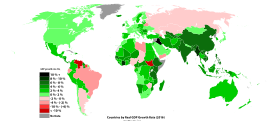Economics
.svg.png)
Economics focuses on the behaviour and interactions of economic agents and how economies work. Microeconomics analyzes basic elements in the economy, including individual agents and markets, their interactions, and the outcomes of interactions. Individual agents may include, for example, households, firms, buyers, and sellers. Macroeconomics analyzes the entire economy (meaning aggregated production, consumption, savings, and investment) and issues affecting it, including unemployment of resources (labour, capital, and land), inflation, economic growth, and the public policies that address these issues (monetary, fiscal, and other policies). See glossary of economics.
Other broad distinctions within economics include those between positive economics, describing "what is", and normative economics, advocating "what ought to be"; between economic theory and applied economics; between rational and behavioural economics; and between mainstream economics and heterodox economics